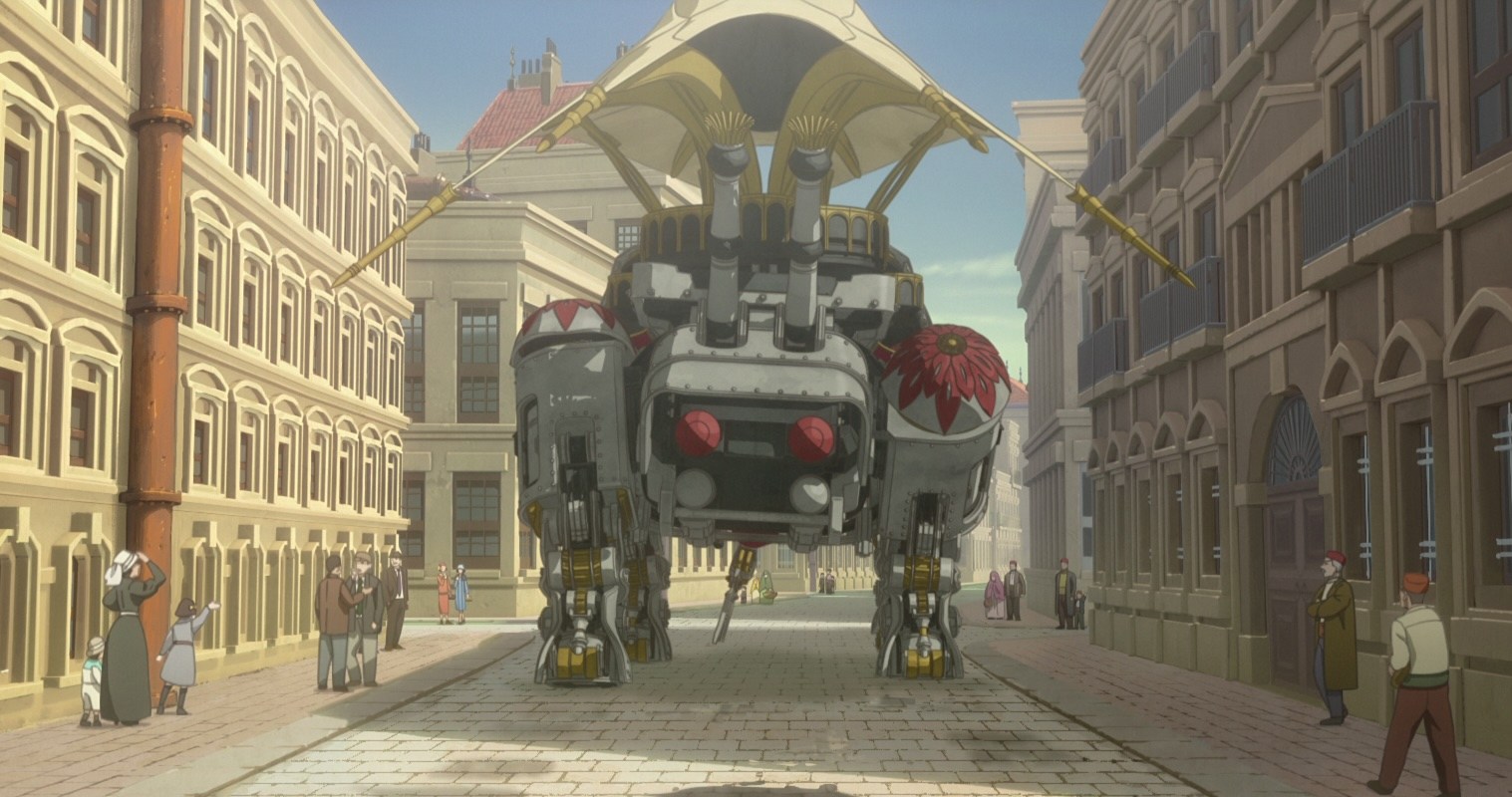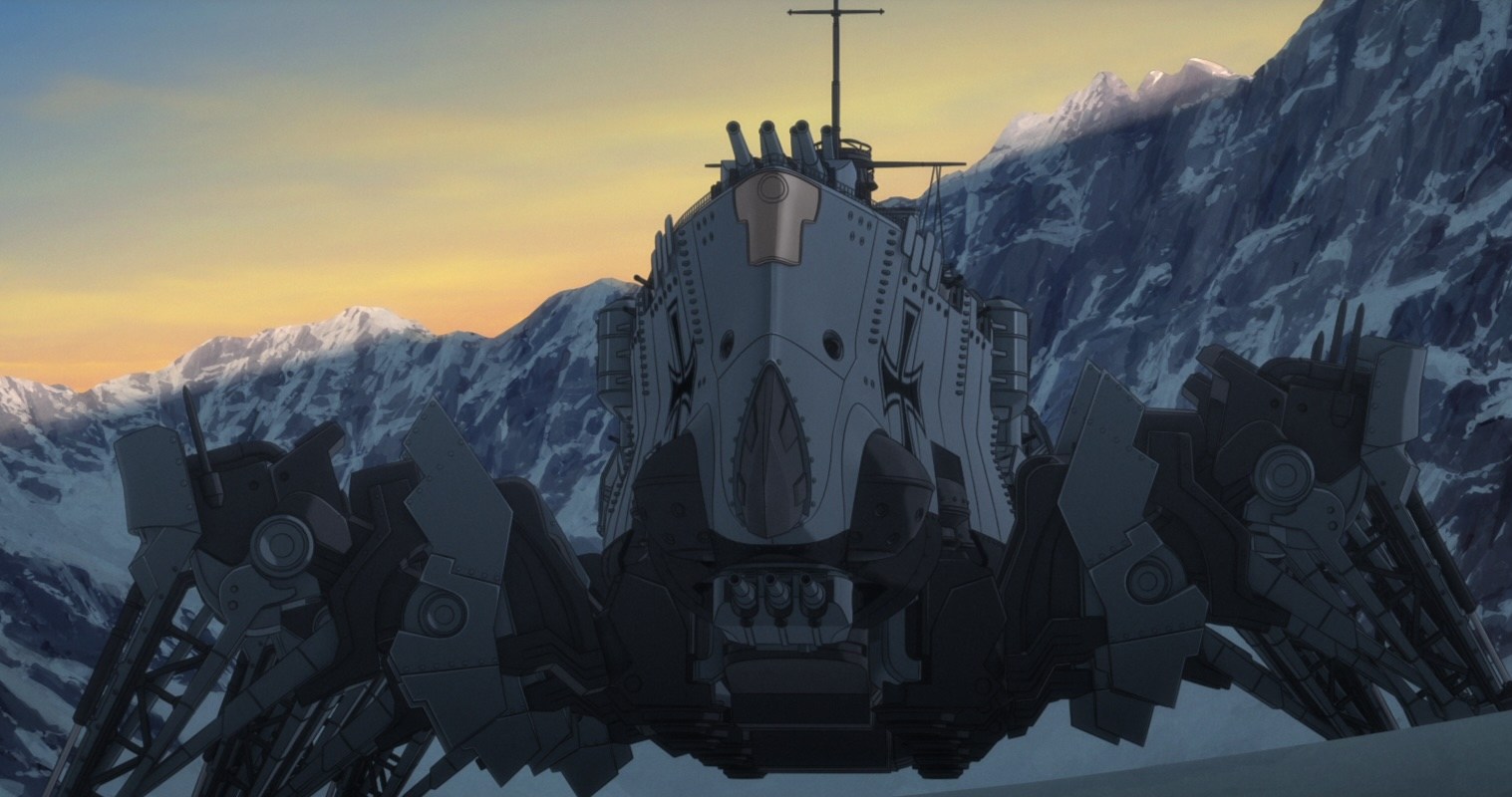Leviathan, Netflix’s anime adaptation of Scott Westerfeld’s World War I alt-history trilogy, offers a wild new twist on the dawn of industrialized warfare. Writing about an era when humans began killing each other at a scale that was previously unimaginable, Westerfeld imagines the Allied Powers using genetically engineered animals as their primary weapons and modes of military transport, while the Central Powers use steampunk mechs. But while that premise offers some great ideas for fights, the trilogy’s short run and YA focus on a central romance produce a very simplistic approach to a complex war. And the anime adaptation simplifies the story even further.
While an enormous number of books, TV shows, and movies center on World War II, World War I hasn’t had the same level of pop culture impact. The Great War was a grinding, protracted conflict mostly fought through trench warfare, and it’s harder to identify a clearly recognizable villain like the Nazis were for WWII. Sam Mendes’ Oscar-winning 2019 film 1917 and Patty Jenkins’ 2017 DC Extended Universe film Wonder Woman use the muddy motivations and chaos of WWI to their narrative advantage, emphasizing the horror of seemingly endless fighting with men in the trenches having no idea what they are fighting and dying for. Leviathan, instead, largely squanders its setting, settling on a fairly simplistic message that war is bad, and it would be better if people from different societies could find common ground and make peace through the power of friendship and cute animals.
The show starts strong, with Aleksandar, the son of Austria-Hungary’s Archduke Franz Ferdinand, learning that his father has been assassinated, and that his country is now at war with its former ally, Germany. Guarded over by his family’s ruthlessly pragmatic ally Count Volger and the far more paternal mechanic Klopp, Alek has to flee in the middle of the night and quickly learn how to pilot a mech as he races to a safehouse on the Swiss border. It’s thrilling stuff, quickly establishing the characters as their lives and freedom are on the line, and showing how Alek’s sheltered naïveté immediately becomes a liability.
On a collision course with Alek is Deryn Sharp, a Scottish teenage girl who disguises herself as a boy and enlists as airman Dylan Sharp, because it’s the only way she’ll be allowed to fly with the British military. In the battle between the retro-tech focused “Clankers” and the neobiology-focused “Darwinists,” the latter has the cooler-looking vehicles, with Deryn starting her military career aboard a giant jellyfish that floats like an observation balloon, and winding up on a flying zeppelin-like ecosystem built around a massive sky-whale. The outbreak of war provides an opportunity for wild aerial fighting that matches early airplanes against bomb-dropping bats and birds. The whole affair is crisply animated with bold colors by Studio Orange, the studio behind Beastars and Trigun Stampede, proving its custom brand of 3D animation.
Deryn and Alek’s meeting sets off a classic unlikely-friendship story, as both try to figure out who they can trust with their secrets — though the canny adults around largely see through their attempts at deception. Taking a page from Disney’s Mulan, Deryn also struggles with how to handle her growing feelings for Alek without outing herself, a situation made infinitely awkward by Alek’s unbelievably obliviousness. The romance plot is cute and sweet, even though the story beats are a bit predictable.
But the further the show gets from the front lines of the war, the more its story stalls. It breaks down into four-episode sets, with each set roughly corresponding to one book in Westerfield’s trilogy, and the first four episodes, adapting the series-launcher Leviathan, contain all of the strongest material. A detour to Istanbul in the second arc (covering book 2, Behemoth) offers some great visuals in the form of ludicrously overengineered Ottoman tech, and a clever retooling of actual naval history to include a terrifying glowing sea monster. But that arc mostly just involves Alek trying to figure out what being a good monarch means during a time when Europe was also in the grip of popular uprisings. The third arc is even weaker, with rushed pacing leading to the reveal of a villain whose motivations feel like they belong in a show about World War II instead of World War I.

Leviathan just doesn’t feel sufficiently immersed in the historical setting that inspired it. I wanted to see what trench warfare might look like in a world where mech pilots can race across hostile terrain and genetically engineered bears ferry supplies across Russia, or learn what the equivalent of mustard gas in this setting might be. I’d even be satisfied to learn that the higher technology level means that fighting is shorter and bloodier than WWI actually was, but there’s no indication of that in the show.
Instead of participating in historic battles, the characters are embroiled in a race to get an admittedly adorable bioengineered critter to the right location, so they can then race off to a different location to maybe end the war. It’s all too morally neat. While Alek has a lot of time to give speeches on the importance of peace, there are never any counterarguments showing why other characters view the war as necessary. Volger, the show’s most nationalistic character, just wants to sit out and keep Alek safe. If no one really knows or cares why they’re fighting and they’re just driven by duty to their country, that’s a point worth making in and of itself – particularly as soldiers start dying. Was the bloody cost of being in the skies worth it to Deryn? Leviathan isn’t interested in answering these questions, just moving the plot forward.
It would be easy to ascribe all of the show’s problems to its target audience. A kid-friendly World War I show is certainly a challenge, though Leviathan does evocatively use the simple animation of a helmet falling to the ground to indicate a character has died. Much more irritating is how heavily some of the deaths are telegraphed — war-drama characters, don’t talk about your retirement plans right before a big battle! — and Deryn’s constant use of silly curses like “Barking spiders!” and “bum-rag.” Avatar: The Last Airbender did prove that a series about young heroes flying around a war-torn world on a giant animal could balance romance, rich character development, and shocking depictions of the horrors of war, but Leviathan never comes close to matching its pathos and worldbuilding.

Granted, Avatar had three long seasons to work with, instead of 12 episodes. But it still feels like the Leviathan team could have done more with their resources if they’d kept up the momentum of the early episodes. Instead, they pad out the action with speeches about duty and pretty musical numbers. (Nobuko Toda and Kazuma Jinnouchi of Ghost in the Shell provide the score.) Leviathan is a rare case of a Japanese animation studio adapting material by an American author, and the songs feel like an effort to adhere to anime conventions more than they serve a meaningful plot purpose.
Leviathan’s plots tend to be quickly introduced and then quickly resolved, which means characters constantly change their minds, making them seem shallow. Deep betrayals are swiftly forgiven, and opinions entirely shift based on whether a given plan was successful. World War I lasted for four years, as a consequence of Europe being pulled apart by long-simmering tensions before erupting in a conflict that shaped the course of the rest of the century. Leviathan barely explores the reasons for the conflict or its impact. That leaves both its plot and characters feeling thin. Even the spectacle of mechs armed with lightning guns, trying to shoot a flying whale-ship out of the sky, isn’t dazzling enough to make up for that weakness.
All 12 episodes of Leviathan will be released July 10 on Netflix.
The post Netflix’s Leviathan anime doesn’t do enough with its steampunk WWI setting appeared first on Polygon.




